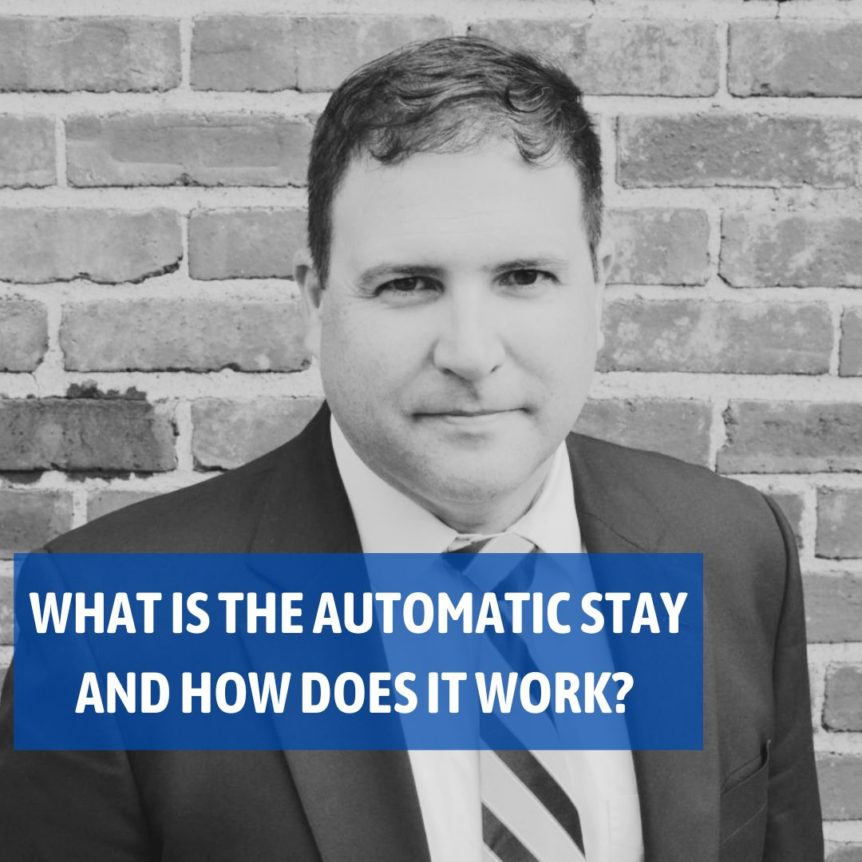By: David DiMatteo and Heather Culp
The instant a bankruptcy is filed, a “stay” usually goes into effect, restraining creditors (those owed money or property) from taking certain actions against the debtor (the person or entity that filed for bankruptcy) or against “property of the estate.” This stay is “automatic” as it happens as a function of the law, without any further action required on the part of the debtor or his/her attorney. The stay provisions of the Bankruptcy Code are found at 11 U.S.C. § 362. The scope of the “Property of the estate” protected by the automatic stay is very broad, encompassing all of the debtor’s property and rights to property, and the Bankruptcy Code at 11 U.S.C. § 541 defines what is and is not property of the estate.
Examples of actions that creditors are usually automatically prevented from taking, unless the bankruptcy court orders otherwise, include: filing or continuing a lawsuit to collect a debt;
- filing or continuing a lawsuit to collect a debt;
- foreclosures where the debtor owns the property being foreclosed on or is a borrower under the loan documents that form the basis of the foreclosure;
- repossessions of personal property (e.g. cars, boats, and other movable collateral)
- wage garnishment; and
- execution on a judgment previously entered.
However, not all actions are halted by the automatic stay. Examples of actions that a bankruptcy filing does not automatically stop are:
- criminal actions;
- many family law actions, including those to establish paternity, for divorce, or concerning child custody or visitation.
Also, there are special rules that apply if the party filing for bankruptcy previously filed for bankruptcy within the year prior or if the bankruptcy court finds that the bankruptcy filing was part of a scheme to hinder, delay or defraud creditors through multiple bankruptcy filings or transfers of property. Under these circumstances, the Court may lift the stay and thereby eliminate the protections to which the debtor may have otherwise been entitled.
What does all of this mean for debtors in bankruptcy? The simple act of filing for bankruptcy relief puts an end, at least temporarily, to most, if not all, collection activity. Instead, creditors must follow bankruptcy rules and procedure to determine their rights. Once a creditor learns of the bankruptcy filing – whether by receiving notice in the mail, or the debtor answering a collection call and telling the caller – in most instances they must stop collection calls, e-mails and texts; stop sending bills and collection letters; stop repossessing property; and return any property that was taken to satisfy a debt but not yet sold or otherwise liquidated.
The automatic stay continues in effect until either the bankruptcy court enters a discharge order or order terminating or modifying the automatic stay. If a creditor “willfully” violates the automatic stay and this violation injures an individual, the law requires the creditor to pay the individual actual damages, including costs and attorney fees, and may be required to pay punitive damages to punish this violation of the Bankruptcy Code. See 11 U.S.C. § 362(k). Here, “willful” means that the creditor’s conduct is deliberate and intentional (the creditor need not have intended to violate the law, instead there must be evidence that it intended the act violating the stay). Most creditors are aware of the automatic stay and what can happen if they violate it and thus take care to stop collection activity once they are aware an individual has filed for bankruptcy protection. Here in the Western District of North Carolina, the bankruptcy court generally requires an individual to warn a creditor that they are violating the automatic stay prior to filing a motion for sanctions for violations. Over the years, we have filed several motions for sanctions for violation of the automatic stay on behalf of our clients and most of them settle out of court, with the creditor paying our clients to compensate them for violating the stay and our law firm to cover the attorney fees and costs arising from the violation. When the issue was not settled out of court, we have obtained several orders sanctioning creditors for violations.
What does all of this mean for creditors who learn that a borrower or guarantor has filed for bankruptcy? Upon learning of the bankruptcy filing, determine whether the automatic stay applies and what it prevents, and then take care to abide by the stay. This may require advice from a bankruptcy attorney; ignorance of the law is generally not a defense to a motion for sanctions for violation of the automatic stay. For example, adjust billing and accounting software or processes so that invoices and accounts receivable reminders are not sent regarding debts owed on the date of the bankruptcy filing. Be aware of the deadlines to preserve rights, such as the deadline to request payment in the bankruptcy if it is one in which money or property is available for creditors. If appropriate, file a motion for relief from the automatic stay, explaining why it should not apply. If a borrower files for Chapter 13 bankruptcy protection and the debt is a consumer debt (one for household, family, or individual purposes rather than for business or profit purposes), then the co-debtor stay set out in 11 U.S.C. § 1301 may apply, preventing attempts to collect from others also liable for the debt even if they are not in bankruptcy.
The bottom line is that it can be expensive for creditors to violate the automatic stay once they know about the bankruptcy filing and have been warned to stop collection activity. Our court has held that punitive damages of $500 or $1000 per action may be appropriate for willful violation of the automatic stay. See, for example, In re Johnson, W.D.N.C. Bankruptcy Case No. 15-50053 (Order Granting Motion for Sanctions filed 2/17/16, Judge Laura Turner Beyer). Every case is different, so contact an experienced and knowledgeable bankruptcy attorney for advice or representation about this area of the law.

